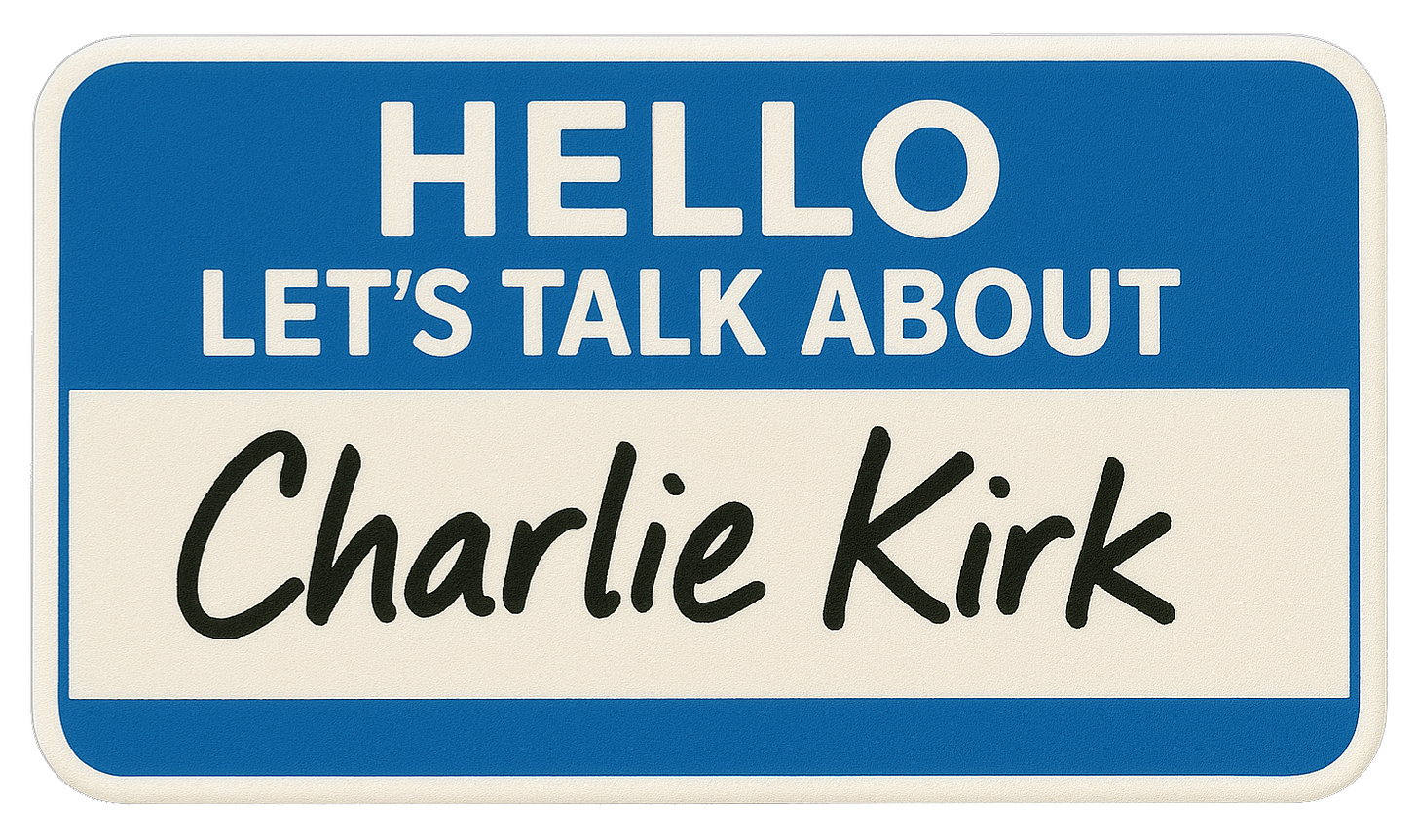How to Talk About Charlie Kirk's Murder with Folks on the Right
As usual, we don't start the conversation where we may want to but where we need to.
It often feels like we’re struggling with a New Outrage every week, right? I started a piece last week about how we talk with folks on the Right about the murder of Charlie Kirk, but before I could get it published, here we are dealing with not just cancel culture over Kirk, but his death being used as an excuse to silence people who are critical of Trump and his administration (threatening talk show hosts, news outlets, other politicians and public servants, and average every day Americans who post or protest; outlawing “Antifa”).
Because of that, I may end up making this an occasional feature: How to talk to Trump voters about [burning issue of the week]. For now, I’ll stick with Kirk, but I’ll probably tackle the Kimmel/free speech issue more fully in a future piece.
Before we go any further, let's revisit of the core principles and tools of our Smart Politics work.
Smart Politics is committed to non-violence. We reject and condemn any and all political violence, and our hearts are with any person and their loved ones who tragically suffer it.
Here’s what we do embrace, teach, and support:
1. We’re focused on having conversations—primarily from a progressive stance—with people who disagree with us. This includes everyone from unengaged independents or one-time “soft” Trump voters, to fully engaged, dedicated MAGA folks. It can mean talking with strangers online or on social media, or even more powerfully when we talk with folks we know in person; family, friends, coworkers, neighbors, etc.
2. I’ve explained in the past why I personally feel this work is important if we’re going to make real, long-term progressive changes in this country. We can’t elect or legislate or prosecute this all away—sooner or later, we’re going to need to have personal conversations if we want to truly lower the temperature, persuade others, and build a better path forward together. Read more about where I'm coming from:
3. Doing this Smart Politics conversational work does not preclude engaging in many other forms of immediate activism, such as protesting and marching, calling legislators, boycotting, striking, building electoral movements for the 2026 elections, etc. However, I believe we must also have more one-to-one conversations with Trump voters if any of that is going to lead to true, lasting progressive change and break the cycle of see-sawing backlash.
4. To do this work effectively, we must manage our feelings and passions, our fears and frustrations, and build up our emotional endurance. Dr. Tamerius has written extensively about that this year, including her free mini e-book Keep Calm and Carry On: Saving Democracy the Smart Politics Way.
So how do we start a conversation about Charlie Kirk?
Let’s focus on a single goal for this conversation (and really, most of them):
To connect and understand one another better as fellow Americans and human beings in order to lower polarization and reduce hateful and violent rhetoric (and actions).
In order to do that, we keep in mind both the Trust Pyramid (our goals in building an emotional connection and trust) and the Persuasion Conversation Cycle (the specific steps that help keep us on track when talking with someone).
First, the Don’ts
When talking with a Trump voter about Kirk, try to avoid the following at the start:
Whether or not Kirk was a "good" person or deserving of how he's been positively framed by some since his death.
That includes hauling out and quoting offensive things Kirk said in the past or getting into the weeds about whether he should be officially honored by the administration, Congress, or other institutions, or venting our feelings about his memorial service and the speakers.
Speculation about his alleged killer’s motivations and affiliations .
Don’t get pulled down into those back and forth matches of trying to parse the alleged shooter’s life and influences and what groups or individuals he may or may not have been connected to. There’s a lot of confusing, complicated, and possibly manipulated information out there about the alleged killer, and it can be useful to know more about him, where he was coming from, who and what may have influenced him. But it’s best not to start the conversation here—we’ll likely just end up lobbing accusations and conspiracy theories back and forth over each other’s defensive walls.
Whether the Left or the Right is more violent in their rhetoric and actions
We'll be itching to pull up lists of stats about what ideologically aligned groups commit more violence in the United States. Don’t. At this point, especially early in the conversation, data will bounce off the other person’s defensive walls and we’ll end up mired again in arguing over whether ours or their sources are accurate or biased.
Pushing back against conspiracies about transgender folks, radical leftists, Antifa, George Soros, etc.
As with many of these points in the “Don’t” list, we may want to get to this topic and share our thoughts about it eventually, but starting out with it too early will once again pull us into the deep swampy quicksand of competing conspiracy theories and arguing about “reality.”
Whether everyday folks or media figures and platforms should be canceled or censored for how they talk about Kirk.
This is an important and emotionally animating topic for many of us, and one we may want to tackle in a whole separate conversation (and a separate article). But for now, initially, let’s try to stay focused on first learning how the other person feels about Kirk and political violence.
As I often say, those are all things you might eventually talk with a Trump voter about (depending on where they’re at on the issues), but only well after you’ve established connection, compassion, and empathy.
That said, we don’t hide how we feel about particular issues if asked, and we’re transparent about our political and ideological stances. If the other person asks us directly how we feel about any of the above topics, we can answer honestly, gently, and briefly along the lines of, “I feel ________, and I suspect we may have different opinions about that, but I’m genuinely interested in hearing how you feel about it.”
But we try not to lead with those—our beliefs are not the initial focus of these conversations. There may be an appropriate time to get into some of the particulars later, but initially our conversations should be primarily about listening, learning, understanding, and connecting with the other person.
Now, the Do’s
Instead, try asking questions like these:
How did you feel about Charlie Kirk? What did he mean to you? Was he someone you were familiar with? Supported?
The first conversation I had with an older supporter of Kirk surprised me in that she was distraught because she saw Kirk as a laudable religious influencer and organizer, especially praising him for bringing Christianity to younger people—much like a youth pastor. This was striking to me in the hours following his death, because I only saw Kirk in a partisan political frame. This is why we ask—to work past our assumptions of what others are thinking.
If someone says they admired Kirk because he promoted open and honest communication and was willing to talk with folks on the other side, we don’t fire back how we may personally feel about Kirk’s debate approach and overall sincerity. Instead, we grab hold of the opportunity and lean in: “Yes, I believe in respectful, open conversation, too, which is why I appreciate you and I can talk about this. I’d love if we all pursued more of this.”
How are you personally feeling since his murder? Has the tragedy affected you emotionally? What reactions and feelings has it raised in you?
Some folks who followed Kirk are very personally upset about his specific murder. Others may be more upset about the chilling implications of any political assassination. Still more are simply horrified by the brutal and very public killing of a fellow human being.
Whatever the case, we work to find empathy for their hurt and fear—as we always say, we are not validating their opinion of Kirk or of Kirk’s past stances, we’re validating the pain and emotional suffering his death has caused some people.
Forget whether pundits and politicians and online influencers are being sincere or opportunistic in their canonizing of Kirk—assume the feelings and fears of the average person we’re talking to are sincere.
Has Kirk’s murder affected how you feel about Americans on the Left/progressives/Democrats/liberals?
Notice the difference between this and the “Don’t” above. Don’t argue whether the Left or the Right is more violent in their rhetoric and actions. Instead, do ask them how they personally feel about folks who disagree with them politically.
Depending on where their reply goes, it never hurts to ask them to define what they mean when they use terms like “Leftists,” “the radical left,” “Antifa,” “progressives,” “Democrats,” and “liberals.” They may not see them as all the same and might have various hierarchical definitions of and attitudes towards what they see as different “subgroups.”
How do you feel about the rise of political violence in America? What do you feel we can do about it?
This is the core goal of this conversation: How can we form an alliance with the other person, not as progressives or conservatives, left or right, Democrat or Republican, but as fellow Americans and human beings who are deeply concerned about dehumanization of others (including along political or spiritual lines) and the violence that can arise from it?
Ask them, as a potential ally, “How can you and I actually lower the temperature? What can we, as individuals, do in our daily lives, in person and online?”
Remember, even if we don’t come up with immediate concrete plan or steps, just having these conversations is aiding the deeper goal. We’re learning and understanding things about them as people not memes, and hopefully they see us more as fellow humans rather than ideological foes.
The point of all this is to better understand where the other person is coming from and what it all means to them (not you). Do we want to persuade them to change their mind about any of it? Sure, maybe eventually. But right now we mostly want to lower defenses, build connections, reduce polarization and negative partisanship, and move us all back from the brink of mutual demonization and dehumanization.
What is the Smart Politics Way?
Smart Politics encourages and teaches progressives to have more productive conversations with Trump voters. We believe the most effective actions for achieving short- and long-term progressive goals involve talking one-on-one with and listening compassionately and constructively to folks with different opinions.
Want to learn more about Smart Politics and get involved?
Every Sunday night (and some Wednesdays), we meet on Zoom to teach, share, and support one another. Sign up for email recaps and reminders about these weekly calls
Locke Peterseim is the Smart Politics Content Manager.








This is an excellent article. We need more concrete tools for practicing nonviolence and this Substack provides it. Thank you , thank you!!
This will work with some, but not all people. The person has to engage in good faith. It wouldn’t have worked with my former MAGA friend. I repeatedly tried to engage with him about underlying values he held (some of which we may have had in common) but he would rarely go there, even with me, whom he trusted with many other life topics. If the person continually tries to evade honest good faith dialogue, it’s time to walk away.